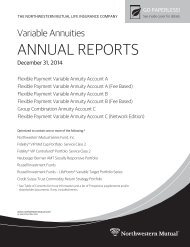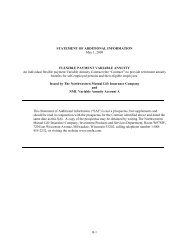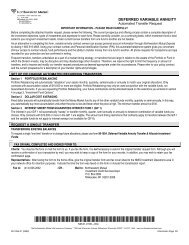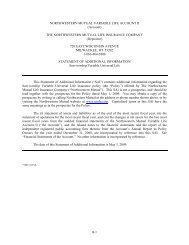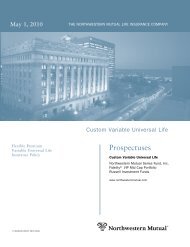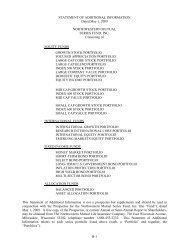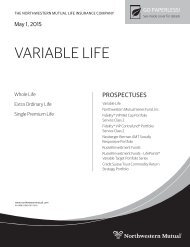B-1 STATEMENT OF ADDITIONAL INFORMATION Dated May 1 ...
B-1 STATEMENT OF ADDITIONAL INFORMATION Dated May 1 ...
B-1 STATEMENT OF ADDITIONAL INFORMATION Dated May 1 ...
Create successful ePaper yourself
Turn your PDF publications into a flip-book with our unique Google optimized e-Paper software.
2. Staggered BoardIf a company has a "staggered board," its directors are elected for terms of more than one year andonly a segment of the board stands for election in any year. Therefore, a potential acquiror cannotreplace the entire board in one year even if it controls a majority of the votes. Although staggeredboards may provide some degree of continuity and stability of leadership and direction to the boardof directors, the Adviser believes that staggered boards are primarily an anti-takeover device and willvote against them. However, the Adviser does not necessarily vote against the re-election ofstaggered boards.3. "Blank Check" Preferred StockBlank check preferred stock gives the board of directors the ability to issue preferred stock, withoutfurther shareholder approval, with such rights, preferences, privileges and restrictions as may be setby the board. In response to a hostile take-over attempt, the board could issue such stock to a friendlyparty or "white knight" or could establish conversion or other rights in the preferred stock whichwould dilute the common stock and make an acquisition impossible or less attractive. The argumentin favor of blank check preferred stock is that it gives the board flexibility in pursuing financing,acquisitions or other proper corporate purposes without incurring the time or expense of ashareholder vote. Generally, the Adviser will vote against blank check preferred stock. However, theAdviser may vote in favor of blank check preferred if the proxy statement discloses that such stock islimited to use for a specific, proper corporate objective as a financing instrument.4. Elimination of Preemptive RightsWhen a company grants preemptive rights, existing shareholders are given an opportunity tomaintain their proportional ownership when new shares are issued. A proposal to eliminatepreemptive rights is a request from management to revoke that right.While preemptive rights will protect the shareholder from having its equity diluted, it may alsodecrease a company's ability to raise capital through stock offerings or use stock for acquisitions orother proper corporate purposes. Preemptive rights may therefore result in a lower market value forthe company's stock. In the long term, shareholders could be adversely affected by preemptive rights.The Adviser generally votes against proposals to grant preemptive rights, and for proposals toeliminate preemptive rights.5. Non-targeted Share RepurchaseA non-targeted share repurchase is generally used by company management to prevent the value ofstock held by existing shareholders from deteriorating. A non-targeted share repurchase may reflectmanagement's belief in the favorable business prospects of the company. The Adviser finds nodisadvantageous effects of a non-targeted share repurchase and will generally vote for the approvalof a non-targeted share repurchase subject to analysis of the company’s financial condition.6. Increase in Authorized Common StockThe issuance of new common stock can also be viewed as an anti-takeover measure, although itseffect on shareholder value would appear to be less significant than the adoption of blank checkpreferred. The Adviser will evaluate the amount of the proposed increase and the purpose orpurposes for which the increase is sought. If the increase is not excessive and is sought for propercorporate purposes, the increase will be approved. Proper corporate purposes might include, forexample, the creation of additional stock to accommodate a stock split or stock dividend, additionalstock required for a proposed acquisition, or additional stock required to be reserved upon exercise ofemployee stock option plans or employee stock purchase plans. Generally, the Adviser will vote infavor of an increase in authorized common stock of up to 100%; increases in excess of 100% areevaluated on a case-by-case basis, and will be voted affirmatively if management has provided soundjustification for the increase.7. "Supermajority" Voting Provisions or Super Voting Share ClassesA "supermajority" voting provision is a provision placed in a company's charter documents whichwould require a "supermajority" (ranging from 66 to 90%) of shareholders and shareholder votes toapprove any type of acquisition of the company. A super voting share class grants one class ofshareholders a greater per-share vote than those of shareholders of other voting classes. The AdviserB-140



